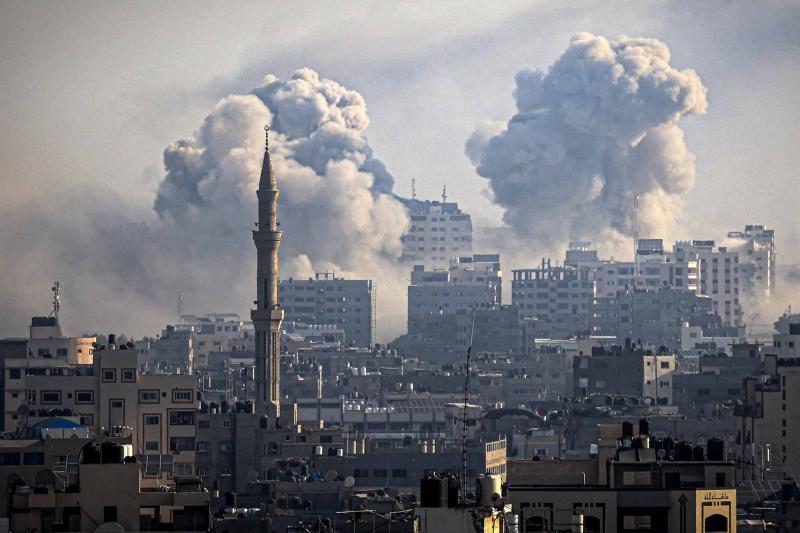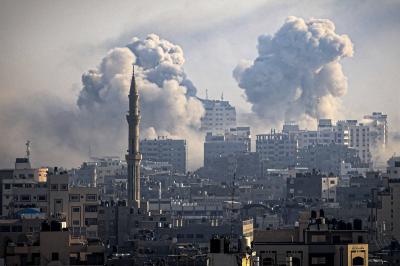The conflict between Israel and Palestinian militants since the attack by Hamas on October 7 has resulted in a significant and increasing number of casualties on both sides, along with mutual accusations of committing war crimes. The war falls under a complex system of international justice that has evolved since World War II. Even if countries claim they are acting in self-defense, the rules of armed conflict apply to all participants in the war.
**What Laws Govern the Conflict?**
The rules of international armed conflict stem from the 1949 Geneva Conventions, which have been ratified by all UN member states and supplemented by provisions issued by international courts concerned with war crimes. A series of treaties regulate the treatment of civilians, soldiers, and prisoners of war within a system generally known as "the law of armed conflicts" or "international humanitarian law." This law applies to government forces as well as organized armed groups, including Hamas fighters.
**What Actions May Violate War Crimes Law?**
According to Human Rights Watch, potential war crimes include the apparent deliberate targeting of civilians by Palestinian armed groups and indiscriminate attacks and taking civilians hostage, as well as the Israeli strikes in Gaza that have resulted in the deaths of hundreds of Palestinians. Hostage-taking, killing, and torture are explicitly prohibited under the Geneva Conventions, and Israel's response may also be subject to investigation for potential war crimes. In response to Hamas violence, Israel has besieged the Gaza Strip, home to 2.3 million people, and launched the most intense bombing campaign in the 75-year history of the Israeli-Palestinian conflict, destroying entire neighborhoods. UN Secretary-General Antonio Guterres called on Tuesday for the protection of civilians, expressing concern over "clear violations of international humanitarian law" in Gaza.
**What Do the Geneva Conventions Say?**
The overarching goal of the Geneva Conventions, and thus international humanitarian law, is to protect civilians in times of war and to mitigate suffering during conflict. Under the laws of armed conflict, combatants include members of state armed forces, military forces, voluntary forces, and non-state armed groups. A blockade can be considered a war crime if it targets civilians and is not a legitimate means of undermining Hamas's military capabilities, or if it is found to be disproportionate. Directly targeting civilians or civilian property is absolutely prohibited under the laws of armed conflict. However, there are instances where civilian property may become legitimate military targets. Even in these cases, attacks on military targets must be proportionate, meaning that they should not result in excessive civilian casualties or damage to civilian property. Proportionality is not a numbers game that compares the number of civilian casualties on one side with the other; rather, civilian fatalities must be proportionate to the direct and concrete military advantage expected from that specific attack.
**What Institutions Can Prosecute Alleged War Crimes?**
Initially, alleged war crimes are prosecuted by local jurisdictions, which in this case are the courts in Israel and the Palestinian territories. If Palestinians alleged to have committed atrocities in Israel and anyone believed to have committed crimes in the occupied Palestinian territories are not brought to justice domestically, the International Criminal Court (ICC) in The Hague is the only international legal body authorized to bring charges. The Rome Statute of the ICC grants the court legal authority to investigate crimes allegedly committed on the territory of member states or by nationals of these states, in the event of "the unwillingness or inability" of local authorities to carry out such actions.
**What is the Role of the International Criminal Court?**
The ICC, established in The Hague in 2002, is a permanent court specializing in war crimes worldwide. Its jurisdiction includes war crimes, crimes against humanity, and genocide within its 123 member states or committed by nationals of those states. Many of the world's major powers, including China, the United States, Russia, India, and Egypt, are not members of the court. The ICC recognizes Palestine as a member state, while Israel rejects the court's jurisdiction and does not officially engage with it. Despite its limited budget and staff, the ICC prosecutor is currently investigating 17 different cases spanning from Ukraine and Afghanistan to Sudan and Myanmar. The ICC has been conducting an investigation into allegations of war crimes and crimes against humanity in the occupied Palestinian territories since 2021. However, this investigation has not resulted in any issued arrest warrants.




